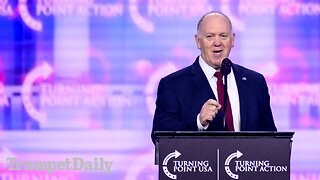Premium Only Content

TOP 10 PROBLEMS WHICH ARE FACING BY THE PEOPLE OF INDIA
Poverty:
India is home to one of the largest populations of people living below the poverty line. Poverty remains a significant challenge, with millions struggling to meet their basic needs such as food, clean water, sanitation, and healthcare. The lack of economic opportunities, inadequate social security systems, and uneven distribution of resources contribute to the persistence of poverty in India.
Unemployment:
Unemployment is a pressing issue in India, particularly among the youth. Despite economic growth, job creation has not kept pace with the increasing number of job seekers. The lack of skilled labor, low employability, and a widening skills gap contribute to the high levels of unemployment. Addressing unemployment requires a focus on skill development, entrepreneurship, and fostering a conducive business environment.
Education:
While efforts have been made to improve education in India, access to quality education remains a challenge, especially in rural and marginalized communities. Issues such as inadequate infrastructure, lack of qualified teachers, low enrollment rates, and high dropout rates hinder educational development. To address this problem, investments in educational infrastructure, teacher training, and inclusive policies are crucial.
Healthcare:
Access to affordable and quality healthcare is limited in India, particularly in rural and remote areas. Public healthcare infrastructure is often inadequate, resulting in overcrowded hospitals, insufficient medical personnel, and a lack of essential medical equipment and medicines. High out-of-pocket expenses, particularly for catastrophic illnesses, further exacerbate the healthcare burden on individuals and families. Improving healthcare infrastructure, increasing funding, and implementing effective health insurance schemes are vital to address this issue.
Infrastructure:
Inadequate infrastructure development is a significant impediment to India's progress. Transportation networks, including roads, railways, and airports, often suffer from congestion, poor maintenance, and insufficient capacity. Additionally, access to electricity, clean water, and sanitation facilities remains a challenge for many. To overcome these issues, investments in infrastructure, effective urban planning, and sustainable development practices are essential.
Corruption:
Corruption is a pervasive problem in India that affects various sectors, including governance, public services, business transactions, and judiciary. Corruption undermines economic growth, erodes public trust, and hampers the effective delivery of services and justice. Strengthening transparency, accountability, and anti-corruption measures, along with promoting ethical governance, are crucial to tackle this issue.
Gender Inequality:
Gender discrimination and violence against women persist in India despite progress in recent years. Women face various challenges, including gender-based violence, limited access to education and employment opportunities, gender pay gaps, and restricted participation in decision-making processes. Addressing gender inequality requires robust legal frameworks, awareness campaigns, and social empowerment programs to create a safe and equal society for all.
Caste System:
The caste system, deeply rooted in Indian society, continues to pose challenges to social cohesion and equality. Discrimination based on caste affects access to education, employment, and healthcare, perpetuating social and economic disparities. Efforts to promote social inclusion, raise awareness, and enforce laws against caste-based discrimination are necessary to combat this issue.
Environmental Degradation:
India faces significant environmental challenges, including air and water pollution, deforestation, soil erosion, and climate change. Rapid industrialization, urbanization, and unsustainable agricultural practices contribute to these problems. Addressing environmental degradation requires sustainable development practices, renewable energy adoption, conservation efforts, and effective waste management policies.
Communal and Religious Tensions:
India is a diverse country with various religious, ethnic, and linguistic communities. However, communal tensions and religious conflicts occasionally arise, leading to violence and social unrest. Promoting interfaith harmony, religious tolerance, and fostering inclusive policies that respect diversity and protect the rights of
-
 1:49:14
1:49:14
2 MIKES LIVE
19 hours ago2 MIKES LIVE #160 We're Back! Deep Dive Monday!
104K22 -
 54:28
54:28
LFA TV
1 day agoTrump’s Triumphant Year | Trumpet Daily 12.30.24 7PM EST
90.8K15 -
 2:28:37
2:28:37
Quite Frankly
17 hours ago"2024 Review, Homunculus Flu, Old/New Year Predictions" 12/30/24
111K16 -
 14:04:17
14:04:17
RonjnJeremy
20 hours ago $9.64 earnedClassic Wow 20th Anniversary edition HC SF, Rogue..PT8 lvl 46+ Just need to stay alive...
126K6 -
 1:50:28
1:50:28
Jesús Enrique Rosas
17 hours agoEp. 51: Gates wants CENSORSHIP, Colbert MESSES UP, AOC meltdown, Hanks LEAVING and MOAR!
134K98 -
 1:45:47
1:45:47
The Quartering
19 hours agoHuge Censorship Law To Pass, Trump Endorses Johnson, TikTok is Saved? & Today's News!
156K92 -
 55:59
55:59
The Amber May Show
18 hours ago $1.86 earnedCommon Behaviors That May Indicate You Are In An Abusive Relationship| Grace Bishara
41.6K1 -
 1:54:42
1:54:42
MTNTOUGH Fitness Lab
14 hours agoThe MTNTOUGH 8 Week LIVE READY Challenge w/ Kyle Kamp | MTNPOD #97
32.1K -
 2:25:15
2:25:15
WeAreChange
13 hours agoTrump Make CRYPTIC Post! Bill Gates Requested Meeting With Elon Musk At Mar-a-Lago??
47.1K29 -
 53:39
53:39
PMG
3 days ago $3.80 earned"Allegations Against Diddy & Usher, $150K Bounty on Trump, RINO Speaker Caves w/Steve Baker"
32K4